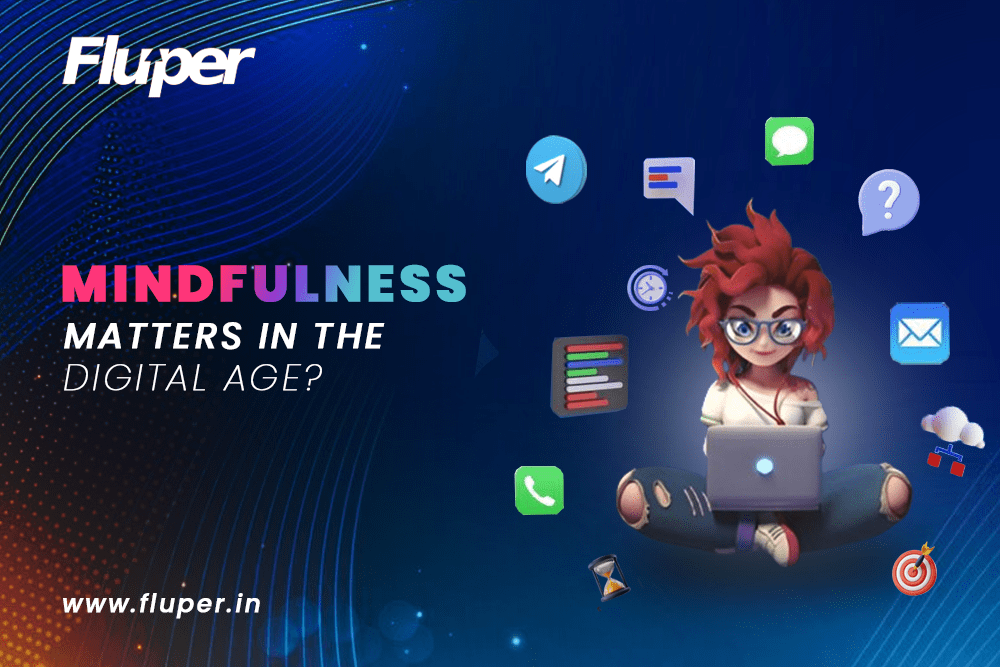Introduction
In this rapidly changing and advanced world- stress has become an integral part of our lives. The digital transformations that impact our lives will have some positives, but they also add new ways of stress and anxiety. Now, we can be aware of new happenings within seconds. It is a positive way to stay connected with the world, but it remains in our subconscious and can impact people’s minds.
Frequently checking your mobile phone & watches and consuming information on various subjects while trying to stay connected with new trends in the market can impact your mental well-being. In this blog, we will explore how to practice mindfulness in the digital age and discover the top apps for stress relief and mental wellness.
Correlation of Digital Era & Stress
The development of mobile phones, social media, online news platforms, and digital watches has completely transformed our lives. Undoubtedly, it has brought people closer together and provided numerous benefits, but it has also increased the stress level, which will impact our mental health.
Now, we can understand some of the parameters that cause stress and can affect our well-being.
- Continuous connectivity: With the expansion of the internet and mobile phones, we are connected to the web, social media platforms, and news all the time. Constant access to the internet can lead to stress.
- Access to Information: Our minds are filled with an enormous amount of information, much of which is unnecessary. The constant flow of work pressure, news, and emails fills our heads with a cluster of information.
- Social Media: With all this, the remaining piece will be due to social media, multiple unnecessary mishaps, and most of the content consumed by us being negative. Always creating a nasty impact on our lives is not good, and all that stuff is ultimately adequate. According to a study, as of 2024, the average daily social media usage of internet users worldwide amounted to 143 minutes.
- Digital Distractions: The web is full of distractions, from online streaming to games. These distractions can limit your productivity and increase unnecessary stress in your mind.
- Cyberbullying: Cyberbullying is a significant cause of stress and a contributing factor to the increasing number of suicide cases. In the last year, thousands of cyberbullying cases has filed. According to the National Crime Records Bureau, there has been a 36% increase in cyberbullying and cyberstalking in India.
One well-known case is the Bois Locker Room incident, which involved an Instagram group with this name. This group consisted of teenage boys from Delhi who were chatting and sharing obscene images & then the chat got leaked by one of their members and included the obscene images of 15 girls.
Mindfulness is the only solution.
To find viable answers, one must go to the past. An age-old Buddhist technique called mindfulness is becoming more popular and used to reduce stress and improve general well-being. Mindfulness is about focusing on the present moment with intention and without passing judgment. It reduces anxiety, breaks up rumination patterns, and makes us more resilient to stress.
In our technology-driven lives, mindfulness in the digital age is a timely response to unique challenges. In the digital age, we can reduce stress by using mindfulness techniques and apps. Let’s explore the benefits of mindfulness and find the best apps and techniques available.
The Emergence of Mental Health Apps
With the increasing popularity of smartphones and gadgets, the need for mental health apps also arises & it is due to the awareness of mental health issues in society. These healthcare apps offer numerous health benefits and provide easy access to mental health resources, making them convenient and affordable. Over time, they have changed their features to therapy sessions, meditation guides, and mood tracking.
The demand for mental health apps has increased due to several reasons. Firstly, there is growing awareness of mental health. Secondly, stress has become an integral part of today generation & there can be multiple reasons, but work is one of them, leading to a need for healthcare apps. If you are looking for a healthcare app developement and want to connect with a prominent app-making company, I would suggest going with Fluper.
Mindfulness Apps: A Sustainable path to improve well-being
In a technology-driven world, we should use tools to bring awareness into our lives. With the help of mindfulness apps, one can easily add relaxation exercises and mindfulness meditation practices into their daily lives. Below are some crucial apps that can help you manage stress and mindfulness in the digital age:
- Headspace
It is one of the most popular mindfulness apps, well-known for its user-friendly interface and a broad range of specialized meditation sessions tailored to the needs of today’s generation. The app offers a wide range of topics like improving sleep, increasing focus, and reducing stress. Additionally, the app has a unique feature called Mindful Moments, which includes a full-day exercise routine.
- Calm
Calm is a highly-rated app that offers a wide range of relaxation techniques, guided meditations, and sleep stories. The best part is that they are narrated by famous voices such as Matthew McConaughey and Stephen Fry.
- Insight Timer
Insight Timer app offers free access to a vast library of specialized meditation sessions, making it the preferred choice for many due to its cost-effective mindfulness solution. Similar to other apps, it also provides specialized meditation sessions.
- 10% Happier
This app was created by the famous news anchor Dan Harris; 10% Happier is designed for people who want to delve into the spiritual aspects of mindfulness. The app has a range of practical, science-backed mindfulness techniques and expert advice.
- Breathe
Breathe is an easy-to-understand app that focuses on the basics of relaxation & meditation. It offers a variety of breathing exercises and visualizations to help users manage stress and anxiety.
- Aura
Aura is an exceptional mindfulness app because of its AI feature, which helps users develop personalized meditation sessions based on their preferences. It also offers a wide range of content, including life coaching, mindfulness exercises, and sleep stories.
- Waking Up
Created by philosopher Sam Harris, this app highlights philosophical and scientific aspects of mindfulness. The app gives you daily lessons and meditations designed to clear your mind on consciousness and well-being.
Most of these apps provide free versions with multiple options for subscribers. These apps have so much to offer for their users; you have to choose one that suits your needs.
Benefits of Mental Wellness Apps
The concept of mental wellness apps is not new; it has been since 2010. With the rising number of smartphones, the need for such apps has also risen. Let us explore some of the benefits that mental wellness apps offer.
- Reduction of Stress
By adding relaxation and lowering the stress response in the body, mindfulness practices can help us to manage our stress. Regular exercise helps our body to maintain a calm and healthy mind by lowering cortisol levels.
- Increased Concentration and gives Output
In this world of distractions, being attentive can help us to concentrate better and work more efficiently. It helps us focus on our work and makes us more efficient in completing one task at a time rather than trying to multitask.
- Enhanced Self-Recognition
In my understanding, Self-awareness is what mindfulness is all about.
It helps us understand our process and behavior of responding and helps us promote personal development.
- Improve sleep
With the increase in screen time, our sleeping patterns have been disturbed. By adding mindfulness to our daily lifestyle, it helps us improve our sleep patterns as well as the quality of it.
Challenges and Concerns in Health Tech
Although mental health apps offer numerous benefits, they also come with multiple challenges and concerns that need to be addressed. Let us examine some of the challenges in health tech.
Quality Assurance
As an app developer, one should ensure the quality of the app they are delivering. With the increasing number of apps on the Play Store, it has become difficult for users to choose one. These kinds of apps should have a simple user interface, and the developer should work with professionals in the industry to ensure that their apps are effective.
Data Privacy
Privacy is a crucial issue, particularly with healthcare apps. Trust is vital when a user downloads an app; as a developer, you must deliver. Therefore, healthcare app development services should include strict adherence to privacy checks and testing.
Accessibility
While the world has become a little easier with mental health apps, we can still see multiple barriers between most people and the apps. Lack of internet access, affordability, and digital literacy are some reasons. We should make efforts to make it accessible to every individual.
Future Trends in Digital Healthcare
If we talk about the future of digital healthcare, it looks very promising. The healthcare app development sector will surely see massive growth shortly and is expected to reach 105.9 billion USD by 2030. Let us explore some trends that can be useful to enhance their visibility.
Artificial Intelligence
In the past two years, with the emergence of AI, there has been a chance for mental health care apps to see rapid changes and incorporate features like personalized recommendations and support. AI chat could also become available to address issues and provide immediate support. Apps like Aura have already integrated AI into their interfaces.
Virtual Reality
Virtual reality is a new way that has been introduced in this industry to offer environments for therapy and relaxation. These features are a new way to explore new horizons in this industry.
Wearable Technology
Wearable devices can help track physical and internal health issues in your body. With the help of these products, one can monitor how their body responds and manage their mental health. For example- your smartwatch can help manage your heart rate, making it easier for heart patients to detect problems.
Digital Transformation: A New Era of Mental Healthcare
A new era of increased accessibility has dawned with the digital revolution impacting every industry. People are now habitual in personalised choices. Technology exacerbates mental health problems and it also opens new doors to help us achieve stability. Through the use of technology, we can incorporate numerous advancements in our app.
The growing need for mental health services is being addressed by this shift towards digital solutions, which also makes care more widely available.
Contact Fluper for Mental Healthcare App Development
Fluper is a prominent name in the healthcare app development sector, specialising in mental health app development. With a team of experienced professionals and technical staff with prior experience in healthcare app development, we are leading developers of apps. Fluper ensures that your app is both simple and attractive.











